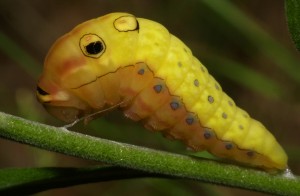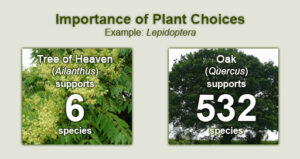We can all agree that plants are very important for many reasons. The most important is that all animals (including us) directly or indirectly depend on plants for food—they are the first link in the food chain. Through photosynthesis, plants capture the energy from the sun and turn that into food and oxygen.
The second link in the food chain is occupied by the herbivores, the animals that eat plants. Insects, including the larvae of Lepidoptera (butterflies and moths), are crucial at this stage. By eating plant material they turn it into essential food protein.

Many animals depend partially or entirely on insect protein for food. Our native birds are a prime example. Even though many adult birds eat berries and seeds, almost all of our terrestrial birds rely on insects and other arthropods (typically, the spiders that eat insects) to feed their young. Insects are rich in the protein that growing birds absolutely need to develop.
“No food for much of anything”
The crucial question is whether certain plants in any given environment are better at this than others. Douglas Tallamy in his book Bringing Nature Home gives us the answer to this. He encourages us to examine the leaves of our native trees and shrubs as compared with the non-natives. You will notice that the alien plants invading our yards have little or no leaf damage from insects, while the natives will show obvious evidence that they are supplying insects with food. Indeed, many of the non-natives or the cultivars of natives peddled to us by conventional nurseries have been selected specifically because they are rarely if ever “attacked” by insects—i.e., they provide no food for much of anything.

Tallamy and others have studied the comparatively great value of native plants regarding the Lepidoptera, and he provides many examples in his book. A dramatic comparison is between our native Oak trees, which support 532 Lepidoptera species, while the alien invasive Tree of Heaven (Ailanthus altissima) supports only two. In addition, at least a thousand other native insect species find homes and food in oak trees, in turn providing food for birds and other creatures. Virtually none of these native insects causes significant harm to the host oak tree. (See how other plants rank)
In a 1987 article in Conservation Biology, the Pulitzer prize-winning author and renowned ecologist E.O. Wilson calls insects “The Little Things that Run the World.”
Follow us through our newsletter and on social media
Support Kalamazoo Area Wild Ones
